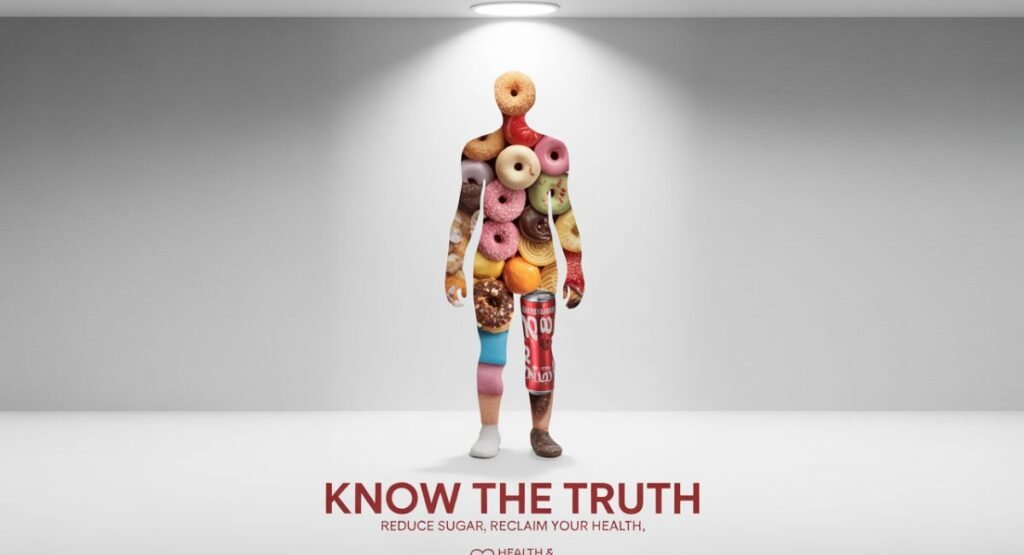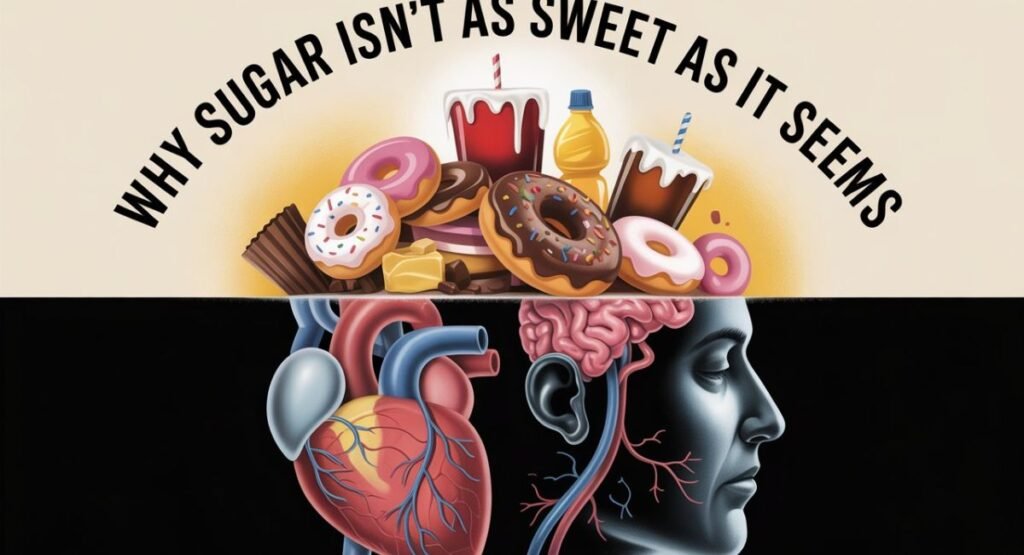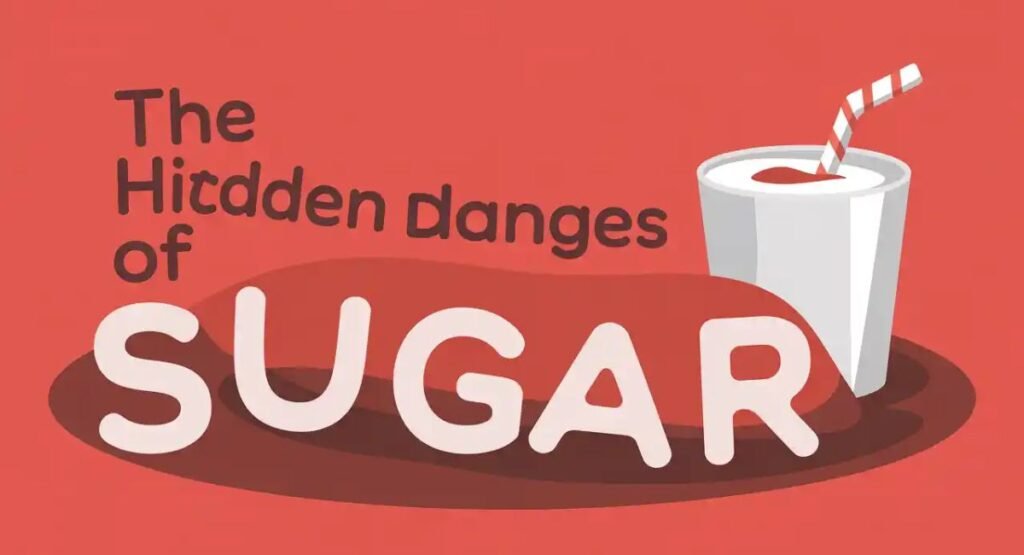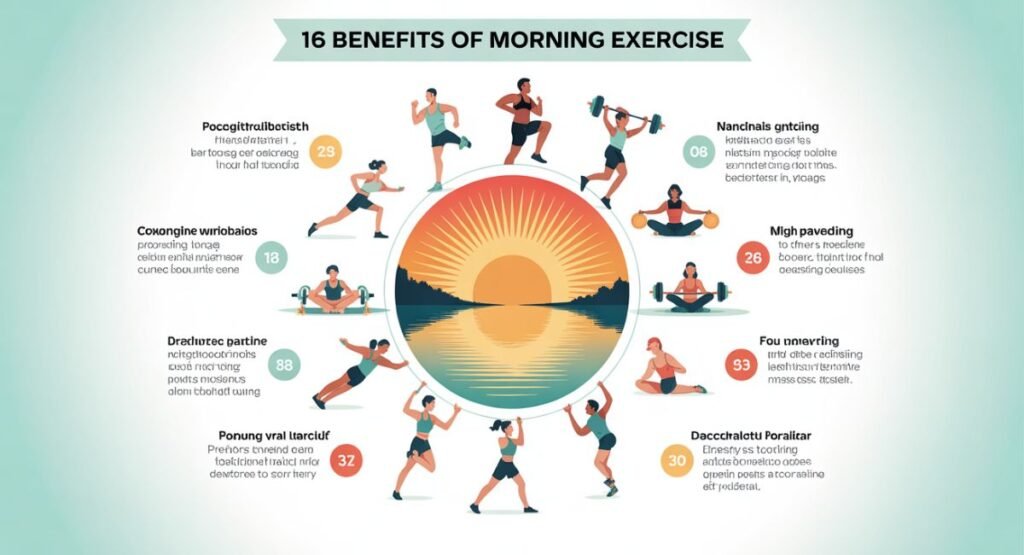Introduction

Sugar might taste sweet—but what it does to your body isn’t. From weight gain and blood sugar spikes to mood swings and poor sleep, the impact of eating too much sugar goes deeper than most people realize. Whether it’s refined sugar in snacks or hidden sugars in “healthy” foods, you’re likely consuming more than your body can handle
. This guide explores the health risks of added sugar, including how it affects your heart, skin, liver, and even your mental health. Most importantly, you’ll learn how to reduce your sugar intake—without feeling deprived. Let’s cut the sweet talk and get real about sugar’s dark side.
Why Sugar Isn’t as Sweet as It Seems

You might love a sugary treat, but what does sugar do to your body behind the scenes? The answer isn’t pretty. Sugar, especially added sugar, has been linked to dozens of health problems. Most processed foods today are loaded with refined sugar and high fructose corn syrup. These sweeteners sneak into your snacks, sauces, cereals, and even “healthy” foods.
The difference between natural and added sugar matters. Natural sugar, like what’s found in fruits or milk, comes with fiber or nutrients. But added sugar has zero nutrition and only adds empty calories. Consuming too much of it leads to blood sugar spikes, cravings, and long-term damage. Understanding this helps you make smarter choices at the store.
7 Serious Health Effects of Too Much Sugar
Wondering about the symptoms of eating too much sugar? Let’s break it down. Sugar may be tasty, but it’s silently harming your body from the inside out. One major side effect is weight gain. Sugar-laden foods offer lots of calories with no fullness, tricking your hunger hormones.
Another major concern is insulin resistance, which often leads to type 2 diabetes. High-sugar diets also raise your risk for cardiovascular disease by increasing inflammation and bad cholesterol. People who consume more refined sugar tend to suffer from skin breakouts, low mood, and even liver fat buildup. Here’s a breakdown:
| Health Effect | How Sugar Causes It |
| Weight Gain | Excess sugar turns to fat, promotes hunger |
| Type 2 Diabetes | Repeated blood sugar spikes lead to insulin resistance |
| Heart Disease | Sugar raises blood pressure & triglycerides |
| Liver Disease | Excess fructose causes fat buildup in the liver |
| Depression & Anxiety | Sugar alters brain chemicals |
| Skin Aging | Sugar causes glycation, damaging collagen |
| Tooth Decay | Sugar feeds bacteria that break down enamel |
How Much Sugar Is Too Much?
So, how much sugar is too much? According to the American Heart Association, men should consume no more than 36 grams (9 teaspoons) of added sugar per day. Women should keep it under 25 grams (6 teaspoons). Sadly, most Americans eat double or triple that.
The tricky part is identifying hidden sugar sources. You might avoid candy and soda but still get large doses from ketchup, bread, or flavored yogurt. Reading labels helps you track and reduce intake. But how to read sugar labels? Look for ingredients ending in “-ose,” like sucrose or maltose. Watch for high fructose corn syrup and sugar’s other sneaky names.
Sugar’s Link to Other Chronic Diseases
Too much sugar doesn’t just cause weight gain. It’s also connected to metabolic syndrome, a group of conditions including high blood sugar, belly fat, and abnormal cholesterol. Over time, sugar contributes to cardiovascular disease and chronic inflammation.
Emerging research also ties sugar to less obvious conditions. It may worsen gout, promote kidney stones, and increase ADHD symptoms in children. These effects are still being studied, but avoiding excess sugar is already a smart move.
Sugar and Your Mental Health
Sugar can affect your brain as much as your body. Have you ever felt super sleepy or anxious after a sugar binge? That’s because sugar causes mood swings. One moment you’re up, the next you crash. This cycle hurts your mental state.
Studies show links between sugar and mental health issues like depression and anxiety. When your blood sugar crashes, so does your mood. Over time, this can lead to more serious problems. It’s like a rollercoaster your brain didn’t sign up for.
Sugar and Aging: Skin, Cells & Longevity
Sugar not only adds pounds, it adds years to your skin. Through a process called glycation, sugar binds to proteins and breaks down collagen. This causes wrinkles, sagging, and dull skin.
Internally, sugar affects cell health too. It speeds up aging by shortening telomeres, the protective ends of DNA. You might not see this on the outside, but inside, your body is aging faster. That’s the real cost of too much sugar.
How to Reduce Your Sugar Intake (Without Misery)
You don’t have to go on a full sugar detox to see results. Start small. Switch soda for sparkling water with lemon. Choose plain Greek yogurt instead of fruit-flavored. Look for snacks with fewer than 5 grams of added sugar per serving.
Knowing how to stop sugar cravings is key. Cravings often come from dehydration, stress, or lack of sleep. Eat more protein and fiber to stay full longer. Over time, your taste buds will reset, and you won’t miss the sugar.
The Sugar Label Trap—What to Watch For
Food companies are sneaky. They use over 60 different names for added sugar, from agave nectar to barley malt. This tricks you into thinking you’re eating healthy. Even foods labeled “natural” or “organic” can contain high levels of sweeteners.
Understanding how to read sugar labels can protect you. Always check the grams of total sugar and see if added sugar is listed separately. Avoid foods where sugar appears in the first three ingredients.
FAQs About Sugar & Health
What qualifies as a “high sugar” food? Anything with more than 10 grams of added sugar per serving is considered high. Cereals, flavored yogurts, and energy bars are common examples.
Is fruit sugar bad for you too? No. Whole fruit has fiber, water, and vitamins, which slow down absorption. So, is fruit sugar bad? Not when eaten in moderation. Avoid fruit juices, though.
Should I quit sugar completely? Not necessarily. But knowing what happens if you stop eating sugar for a week is eye-opening. You feel more energy, a better mood, and clearer skin. Aim for progress, not perfection.
Final Thoughts—A Balanced Approach
So, is sugar bad for you? Yes, when consumed in excess. But you don’t need to fear every cookie. The key is balance. Learn how to cut back on sugar naturally and stay consistent.
Reducing sugar is like planting a seed for long-term health. It’s not about being perfect. It’s about making daily choices that protect your body and mind from the hidden dangers of sugar.




Pingback: Tea Benefits And Side Effects -
Pingback: How To Naturally Lose Weight Fast And Weight Permanently
Pingback: Effects Of Diet On Polycystic Ovary Syndrome (PCOS)